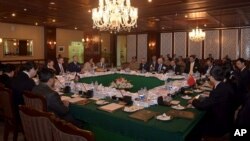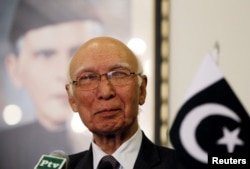Delegates from Afghanistan, Pakistan, China and the United States are due to meet Monday in Kabul to further a four-way dialogue aimed at urgently seeking a negotiated end to the Afghan war. The Taliban insurgency has not yet indicated whether it intends to join the renewed peace efforts.
The four-way contact group of senior Afghan, Pakistani, Chinese and U.S. diplomats held its initial meeting last week in Pakistan where delegates underscored the need for the immediate resumption of direct talks between Afghan government and Taliban officials.
Afghan Foreign Ministry spokesman, Ahmad Shakeb Mustaghani, said his government would present a plan for initiating talks at Monday’s meeting.
“This road map,” he said, “identifies a clear direction for starting and progress in the peace talks."
Pakistan’s role is considered important in bringing the Taliban to the negotiating table because its insurgent leaders are allegedly using the country for directing violence in Afghanistan.
Pakistani officials acknowledged having “limited” influence with the Taliban, but they did not support putting pressure on the group to push it to the table, insisting such a move would be detrimental to the peace efforts.
Role of Pakistan
Pakistan’s foreign policy chief, Sartaj Aziz, said the role of his country must be limited to facilitating the process.
“The process has to be Afghan-led and Afghan-owned as an externally imposed settlement is neither desirable nor it would be sustainable," he said.
Pakistani authorities insisted they have abandoned past policies of siding with the Taliban or other insurgent groups to use them as their proxies.
The government, particularly the military, has come under public pressure to facilitate the Afghan reconciliation process.
The leader of the opposition party ruling in a Pakistani province bordering Afghanistan, Imran Khan, urged the government to do everything possible to help bring peace.
“We would not want [the] Taliban takeover [in Pakistan].If they think that their ideology is good then they should contest elections and win the elections.You cannot impose your ideology through the barrel of a gun,” he said.
Islamabad Institute for Strategic Studies head Masood Khan said Pakistan and Afghanistan needed to put past differences aside.
“It is time to prove the naysayers wrong who claim that the Taliban insurgency will not die down and that the prospects of peace are dim and that Pakistan and Afghanistan are bound to be at odds.Let us continue to make positive affirmations and deliver on them.Our instruments to achieve these goals are resolute diplomacy and statesmanship,” he said.
Chinese, US participation
Outgoing Afghan ambassador to Pakistan, Janan Mosazai, said participation by China and the United States gives assurance to a highly skeptical Afghan nation about the peace process.
“Success will, more than anything else, require continued sincerity, both in words and in actions, to make sure our work remains specific, measurable and time bound and that we do not lose this critical new window of opportunity yet again.The continuation of this recent surge in violence will make sustaining the bilateral Afghanistan-Pakistan rapprochement increasingly difficult to the Afghan people,” said Mosazai.
Pakistani and U.S. officials acknowledged the success in the Afghan peace process would depend on whether the Taliban agrees to rejoin talks with Kabul.
The Islamist insurgency through social media and and pro-Taliban websites has criticized the four-way talks.





